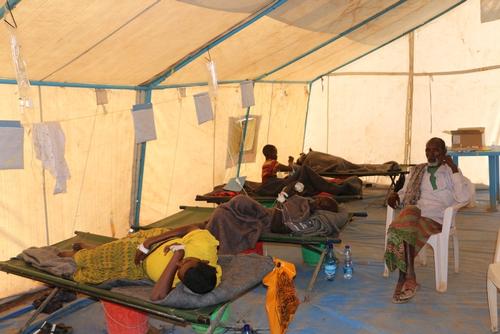An important outbreak of acute watery diarrhoea is sweeping through Doolo zone, in Ethiopia’s Somali region, exacerbated by one of the worst droughts in 30 years. In response, teams from Médecins Sans Frontières (MSF) are working alongside Ethiopian health authorities to bring the outbreak under control, while warning that more external funding and resources are urgently needed to stop the disease from spreading further.
Officially declared on 7 April, the outbreak has affected more than 16,000 people in the whole region since the start of the year, with about 3,500 new cases per month, according to local authorities. The government has so far deployed over 1,200 health professionals, including nurses and doctors, and set up 100 centres to treat people with the disease. Even if an overall decline in acute watery diarrhoea numbers is registered in the region, the risk of re-infection remains high.
Despite all efforts, MSF teams working in some of worst affected locations in Doolo zone of the Somali region say that there are still serious shortages of infrastructure – such as boreholes, pumps, trucks to transport water, and storage tanks for safe drinking water – and a lack of international organisations responding to the emergency.
People in this region, mostly nomadic, generally take advantage of the rainy season to store water for the rest of the year. But little rain has fallen in the past two seasons, resulting in a severe drought, with people in many locations currently surviving on less than two litres of water per day. Without sufficient clean water, many have been forced to use untreated water sources, often resulting in the spread of acute watery diarrhoea.
For health staff, treating patients for acute watery diarrhoea without sufficient supplies of water is a major challenge. Many health centres have been overwhelmed by the suddenness of the outbreak. MSF has worked alongside its partners to strengthen the support to the government’s health centres, as well as to increase the rapid response to temporary sites during outbreaks.
The outbreak is the latest in a series of crises brought on by the drought, which has already caused the cost of food to rise sharply and large numbers of people – women and children in particular – to travel in search of water to keep themselves and their remaining livestock alive.
“All of our animals died,” is commonly heard throughout many of the numerous informal settlement camps. One woman, whose child recovered from severe malnutrition after being treated at MSF’s inpatient therapeutic feeding centre in Wardher, told a similar tale: “Before, we moved around with our animals. But our last camel has just died, and now we have to settle closer to a place where we can find a remaining source of water.” These camps are scattered throughout the zone and make a rapid response more challenging.
Some 5.7 million people are in need of food aid in Ethiopia, according to the UN. Before the current outbreak was declared, MSF and the Ethiopian government had already reported an alarming increase in the number of children suffering from severe malnutrition in Doolo zone.
In the first three months of 2017 alone, MSF teams in Doolo zone treated 2,352 patients for severe acute malnutrition in MSF supported centres, compared to 1,230 in the whole of 2016. Severe acute malnutrition is life-threatening, particularly for young children. MSF teams treating people - together with the health authorities - for acute watery diarrhoea in Geladi and Danod have seen large numbers of children under five with clear signs of malnutrition.
“Drought, malnutrition, and disease are a lethal combination,” says Oliver Schulz, MSF’s head of mission in Ethiopia. “More help is urgently needed to provide clean water, infrastructure, and funding. Unless this happens soon, many more lives will be at risk.”



